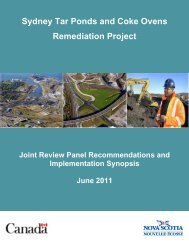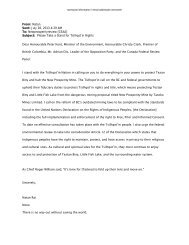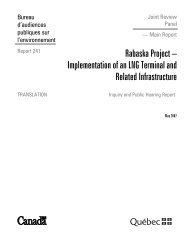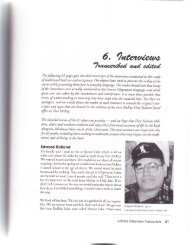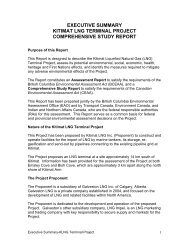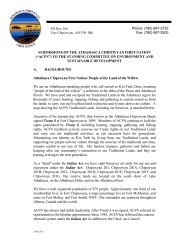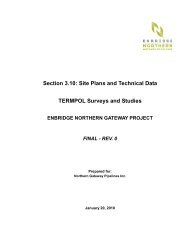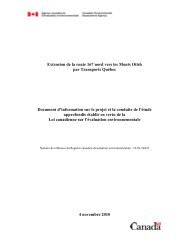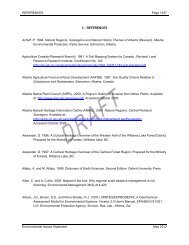- Page 1 and 2: IN THE MATTER OF THE ENERGY RESOURC
- Page 3 and 4: Table of Contents I. Introduction .
- Page 5 and 6: 6.4 Nothing in this article 6 limit
- Page 7 and 8: provincial distribution of powers u
- Page 9 and 10: exclude from the Commission's juris
- Page 11 and 12: 25. The Legislature has expressly e
- Page 13 and 14: and its duty to consult on aborigin
- Page 15: Crown. 35 Regardless of whether the
- Page 19 and 20: efore decision-making bodies set up
- Page 21 and 22: 59. In support of its decision in P
- Page 23 and 24: the Crown, and is still underway, a
- Page 25 and 26: shows that this Panel and the Commi
- Page 27 and 28: V. Judicial Comity and Stare Decisi
- Page 29: argument, and certainly not since t
- Page 32 and 33: Ocean Port Hotel Ltd. v. British Co
- Page 34 and 35: Case Name: ATCO Gas (a Division of
- Page 36 and 37: Page 14 stare decisis does not appl
- Page 38 and 39: Between: Docket: 1001-0172-AC Keith
- Page 40 and 41: Case Name: Carrier Sekani Tribal Co
- Page 42 and 43: HELD: Appeal allowed and matter rem
- Page 44 and 45: Crown in its dealings with Aborigin
- Page 46 and 47: [Emphasis added.] absence of legal
- Page 48 and 49: Page 23 adversely affect it: see Ha
- Page 50 and 51: Indexed as: Bell v. Canada (Canadia
- Page 52 and 53: Page 3 enabling statute, provide an
- Page 54 and 55: the separation of powers under the
- Page 56 and 57: gatekeeper to the tribunal process
- Page 58 and 59: Tribunals, vol. 2. Toronto: Carswel
- Page 60 and 61: were laid down by this Court in Dou
- Page 62 and 63: legislature is to decide upon and e
- Page 64 and 65: of the Canadian people. 16 The link
- Page 66 and 67:
democracy. As with the separation o
- Page 68 and 69:
1985, c. H-6. In particular, is it
- Page 70 and 71:
Marceau J.A. Page 21 must show that
- Page 72 and 73:
Page 23 it clear that no administra
- Page 74 and 75:
appear in person or through counsel
- Page 76 and 77:
to Charter scrutiny. The former rep
- Page 78 and 79:
complaint referred to it by the Com
- Page 80 and 81:
Page 31 All law and law-makers that
- Page 82 and 83:
administrative arm of government as
- Page 84 and 85:
Page 35 whether that legislation wa
- Page 86 and 87:
discriminatory practices". Page 37
- Page 88 and 89:
Human Rights Act and hence inoperat
- Page 90:
cp/d/hbb/DRS/DRS Page 41
- Page 93 and 94:
Page 2 Appeal by the Dene Tha' Firs
- Page 95 and 96:
different from what the Board was t
- Page 97 and 98:
Appeal From: Supreme Court of Canad
- Page 99 and 100:
ights and titles. If consultation i
- Page 101 and 102:
Gregory J. McDade, Q.C., and John R
- Page 103 and 104:
can provide a desired result. The s
- Page 105 and 106:
Imperial Oil Resources Ventures Lim
- Page 107 and 108:
Application for an Oil Sands Mine a
- Page 109 and 110:
Application for an Oil Sands Mine a
- Page 111 and 112:
Application for an Oil Sands Mine a
- Page 113 and 114:
Application for an Oil Sands Mine a
- Page 115 and 116:
KEARL OIL SANDS PROJECT JOINT REVIE
- Page 117 and 118:
Case Name: Kelly v. Alberta (Energy
- Page 119 and 120:
(EUB Decision 2007-061, p. 21) b) W
- Page 121 and 122:
Case Name: Kwikwetlem First Nation
- Page 123 and 124:
Commission had jurisdiction and cap
- Page 125 and 126:
8 As a quasi-judicial tribunal with
- Page 127 and 128:
Utilities Commission Act 45.(1) Exc
- Page 129 and 130:
101.(1) An appeal lies from a decis
- Page 131 and 132:
have their challenge to the adequac
- Page 136 and 137:
Indexed as: Nova Scotia (Workers' C
- Page 138 and 139:
the Canadian Charter of Rights and
- Page 140 and 141:
Page 5 applicable benefits to a fou
- Page 142 and 143:
Provincial Court of Prince Edward I
- Page 144 and 145:
[page528] V. Analysis A. Jurisdicti
- Page 146 and 147:
Indexed as: Ocean Port Hotel Ltd. v
- Page 148 and 149:
independence implicated here. There
- Page 150 and 151:
independence required of a particul
- Page 152 and 153:
the panel that it was his position
- Page 154 and 155:
Introduction PITFIELD J.:-- 6. Ther
- Page 156 and 157:
Appeal From: Indexed as: Paul v. Br
- Page 158 and 159:
doctrine of incidental effects, it
- Page 160 and 161:
Canadian Charter of Rights and Free
- Page 162 and 163:
including its content and scope, or
- Page 164 and 165:
any organ created by the Province o
- Page 166 and 167:
s. 35 rights. This Court's decision
- Page 168 and 169:
Present: Lamer C.J. and La Forest,
- Page 170 and 171:
Page 4 2 S.C.R. 335; Lac Minerals L
- Page 172 and 173:
Page 19 36 It is for this reason th
- Page 174 and 175:
Catchwords: Constitutional law -- C
- Page 176 and 177:
jurisprudence calls for a new appro
- Page 178 and 179:
779; Pinet v. St. Thomas Psychiatri
- Page 180 and 181:
[para. 78] In her view, both the Co
- Page 182 and 183:
agreement violates the Charter and
- Page 184 and 185:
Appeal From: [2008] 2 S.C.R. 483 [2
- Page 186 and 187:
or analogous grounds. Given the lan
- Page 188 and 189:
1 of the Charter. Section 25 is a n
- Page 190 and 191:
Canada. Fisheries and Oceans. An Ev
- Page 192 and 193:
Morin, Alexandre. Le droit à l'ég
- Page 194 and 195:
Richard James Fyfe, for the interve
- Page 196 and 197:
Indexed as: Rio Tinto Alcan Inc. v.
- Page 198 and 199:
consultation under s. 35 of the Con
- Page 200 and 201:
honour of Crown, BC Hydro's represe
- Page 202 and 203:
[page657] Peter W. Hutchins and Dav
- Page 204 and 205:
[page677] or the management of the
- Page 206 and 207:
consider the issue of consultation.
- Page 208 and 209:
Case Name: Slaight Communications I
- Page 210 and 211:
Page 3 The word "like" in the Engli
- Page 212 and 213:
Page 5 tutes a prima facie violatio
- Page 214 and 215:
Page 27 85 Appellant further argued
- Page 216 and 217:
2004 BCSC 1320, 34 B.C.L.R. (4th) 2
- Page 218 and 219:
2004 BCSC 1320, 34 B.C.L.R. (4th) 2
- Page 220 and 221:
Province of Alberta ADMINISTRATIVE
- Page 222 and 223:
ADMINISTRATIVE PROCEDURES AND JURIS
- Page 224 and 225:
ADMINISTRATIVE PROCEDURES AND RSA 2
- Page 226 and 227:
ADMINISTRATIVE PROCEDURES AND RSA 2
- Page 228:
Rights and rree· doms in Canada AP
- Page 232 and 233:
Province of Alberta ADMINISTRATIVE
- Page 234 and 235:
(Consolidated up to 254/2007) ALBER
- Page 236 and 237:
Schedule 1 DESIGNATION OF CONSTITUT
- Page 238 and 239:
Province of Alberta ENERGY RESOURCE
- Page 240 and 241:
ENERGY RESOURCES CONSERVATION ACT C
- Page 242 and 243:
RSA 2000 Section 2 Chapter E-10 ENE
- Page 244 and 245:
RSA 2000 Section 14 Chapter E-10 EN
- Page 246 and 247:
Province of Alberta OIL SANDS CONSE
- Page 248 and 249:
OIL SANDS CONSERVATION ACT Chapter
- Page 250 and 251:
Section 5 OIL SANDS CONSERVATION AC
- Page 252 and 253:
354 Bill 2 Alberta Centennial Medal
- Page 254 and 255:
356 boards our officials met with b
- Page 258 and 259:
) JUDICIAL REVIEW OF ADMINISTRATIVE
- Page 260:
12:4400 Fettering of Judgment 12:44
- Page 267:
6.3 ADMINISTRATIVE TRIBUNALS admini



